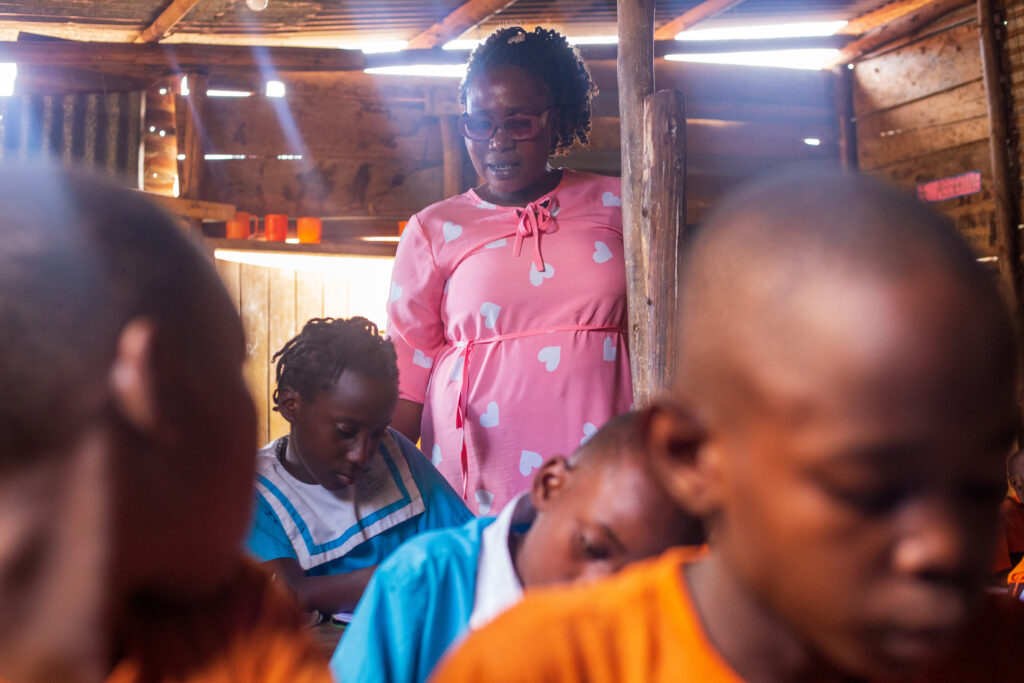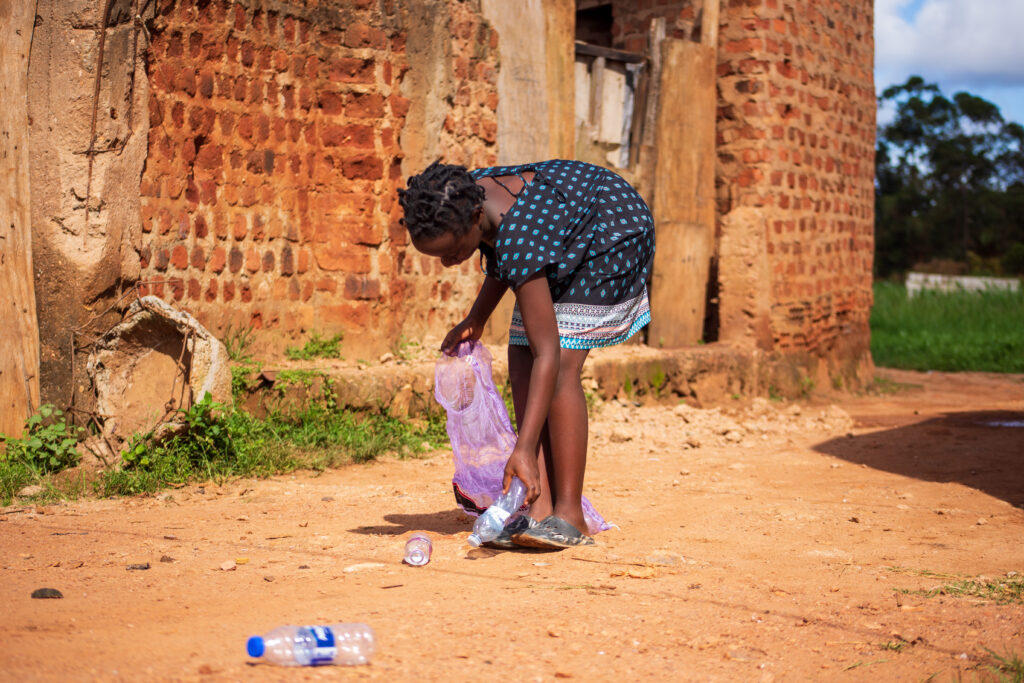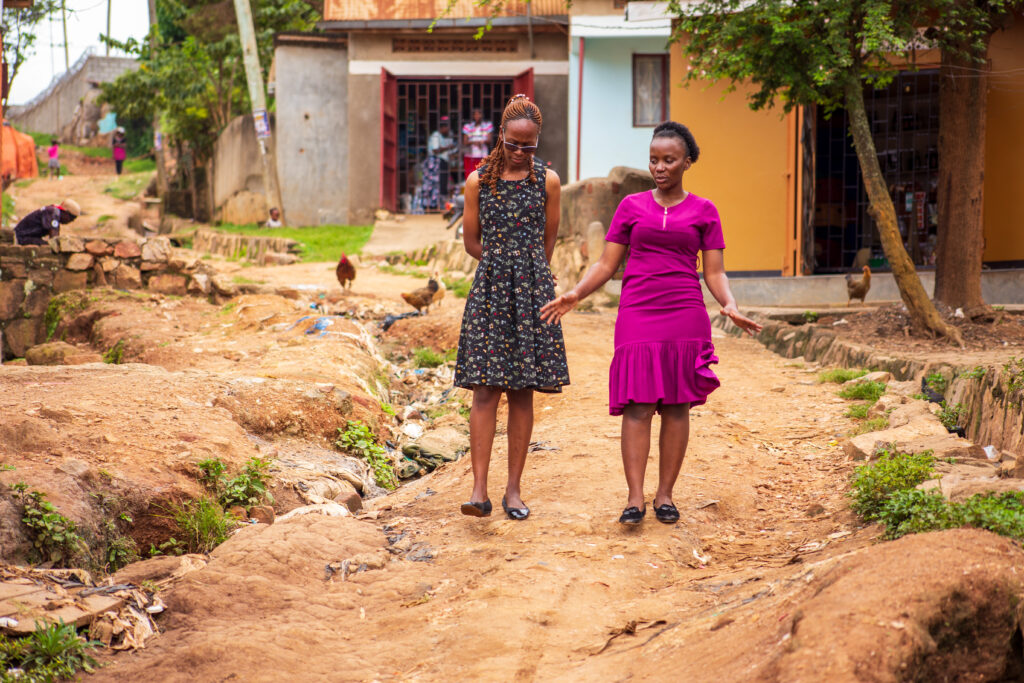Tech & The Environment:
Ugandan Innovator Uses Technology to Incentivize Plastic Waste Collection
Written by: Leticia Mmeeme. Photo and Filmed by Richard Mugambe
Written by: Leticia Mmeeme. Photo and Filmed by Richard Mugambe
In Kajjansi, an urban community about 16 kilometers south of Uganda’s capital Kampala, residents collect plastic waste for points that can be redeemed for school fees or healthcare credits.
Among the active participants is 11-year-old Teopista Nampiima. The child has created an after-school routine to traverse the community for the indiscriminately disposed of bottles and other plastic materials every day, to supplement her mother’s income.
Jolly Ndagire, widowed, takes care of three other children. Whereas Nampiima’s collection can only total about five kilograms a week and fetches a few shillings, it will at least meet the needs of one child.
Nampiima is in Primary Four at Christ the King Primary School, a low-cost elementary school in the community, where she is hatching plans “to become a midwife.”
“The trash collection helps me to meet scholastic needs and school fees for the children. The buyers even go to school and stand surety for me or even make a partial payment for at least one child,” Ndagire says.

Teacher Deborah Namusoke attends to Teopista Nampiima in the Primary Four Class at Christ The King School in Kajjansi. Photo by Richard Mugambe.
The community plastic collection is being pioneered by Recycle Pay, an environmental initiative using mobile digital technology to rally residents against single-use plastics in rapidly urbanising Uganda.
Started by environmental activist and Woman Councilor Kajjansi Maria Nakiganda in 2022, Recycle Pay commenced with an outreach, which sensitised residents about the dangers of plastic waste. Afterward, Nakiganda worked with developers to build an application, which documented all members interested in collecting the trash and served them with digital environmental cards.
The cards contain the resident’s digital data. Whenever they deliver their collection to the scaling centre, it is placed into a machine and the weight of the delivered trash is scored against their data.
“Recycle Pay operates in three simple steps: first, individuals register with us to obtain their card; second, they receive the digital card; and third, they begin collecting plastics. Our system assigns four points for every kilogram of plastics collected, with approximately 125 kilograms needed to earn 50,000 Ugandan shillings,” says Nakiganda.
Plastic disposal is one of the major challenges facing most urban communities in Uganda. While serving as a councilor in Kajjansi town council, Nakiganda saw most of her residents struggling to manage single-use plastic trash.
“I started looking for a way of solving the two problems from the community, garbage, and also educating children and supporting people to pay for hospital bills, personally, it was quite hard to do out-of-pocket contributions. I had to do some research and I found that people were recycling plastics to make different things and that led to the birth of Recycle pay,” she explains.

Teopista Nampiima collects plastic trash after school in her community in Kajjansi outside Kampala. Photo by Richard Mugambe.
Since 2022, Recycle Pay has rolled over 300 residents on the system, who clean up the community daily. While most love to take their cash, she works with community health facilities and schools to serve residents who prefer social services.
About a dozen low-income families are depending on this model to take their children to school.
“At the beginning of the term, Nakiganda visits the school and deposits money for each student in the program. She instructs us not to send any children away from school due to unpaid fees. This gesture also gives us hope that eventually, the school fees for each child will be settled, and students will not be sent home,” says Deborah Namusoke, the head teacher at Christ the King Primary School.
About 150 tonnes of waste are generated in Ugandan urban areas every day according to Dr. Akankwasah Barirega, the Executive Director National Environmental Management Authority (NEMA).
However, 40% of Uganda’s plastic trash remains uncollected which makes the largest contribution of pollution to the ecosystem.
By transforming waste collection into a source of income, RecyclePay is creating a sustainable solution that benefits individuals and communities while also addressing the negative impact of plastic waste on the environment.
In the past three years, the innovation has collected about 3000 kilograms of plastics which is sent to recycling companies.
This innovative sets Recycle Pay apart from traditional waste collection schemes, making it a one-of-a-kind solution that offers both social and environmental benefits.
“Previously, our community was burdened with a significant amount of plastic waste. We have witnessed the reduction of plastic litter and children are going to school. We believe this place will be cleaner and more conducive to living.” explains Godfrey Semuwemba Kasakya, a resident of Kajjansi C.

Environment Activist and Community leader Maria Nakiganda (Left) interacts with Solution Now Africa reporter Leticia Mmeeme. Photo by Richard Mugambe.
However, with the many challenges standing in the way of education access in low-resource communities, children like Nampiima need just more than plastic cash to push their school dreams.
In earlier stories, this publication has summarised trials of Uganda’s education system as a cocktail of cost, infrastructure gaps, socio-economic and cultural barriers that especially work against young girls, low adaptation of technology among others.
As these take some time to fix, Nampiima and the mother are looking at the community initiative to sort one barrier.
“My biggest challenge now is transporting the heavy plastics to the scaling center. Despite this, I have become known in the community for collecting plastics, and many people now donate their plastics to me, knowing that I use them to pay for my children’s education.” Ms. Ndagire explains
© 2022 - Media Challenge Initiative | All Rights Reserved .
© 2022 - Media Challenge Initiative | All Rights Reserved .